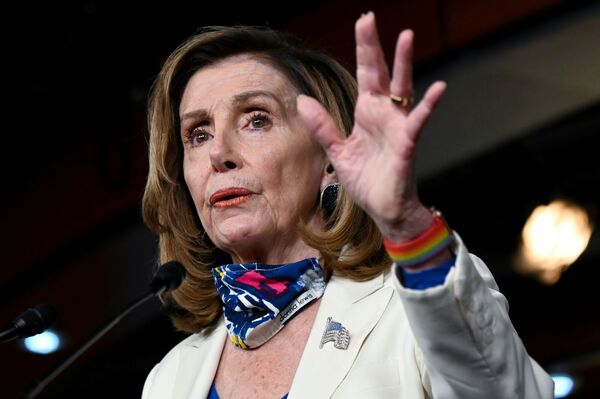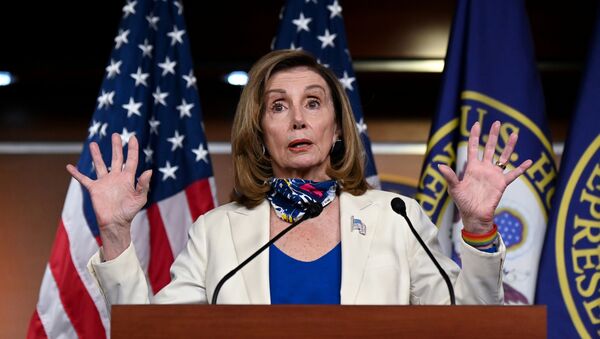Speaker of the House of Representatives Nancy Pelosi had been fending off backlash from some fellow Democrats after she sharply rejected US President Donald Trump's $1.8 trillion coronavirus relief offer made on Friday as “grossly inadequate”.
In a letter to House Democrats sent Saturday, Pelosi lambasted the Trump administration’s proposal as "one step forward, two steps back" in their negotiations on stimulus measures amid the COVID-19 pandemic, reported USA Today.
"In terms of addressing testing, tracing, and treatment, what the Trump administration has offered is wholly insufficient," she wrote in a weekly letter to Democratic colleagues.

Pelosi also suggested the proposal lacked a “strategic plan to crush the virus” and warned that it afforded President Trump too much power in deciding how funds should be spent.
However, some Democrats seemed eager for a deal.
Ro Khanna, D-Calif., a Congressional Progressive Caucus member, tweeted on Sunday that the sum suggested by Trump was "significant".
People in need can’t wait until February. 1.8 trillion is significant & more than twice Obama stimulus. It will allow Biden to start with infrastructure. Obama won in 08 by doing the right thing on TARP instead of what was expedient. Make a deal & put the ball in McConnell court. https://t.co/qAEtd049sW
— Ro Khanna (@RoKhanna) October 11, 2020
Former presidential candidate Andrew Yang tweeted on Saturday, urging Pelosi to “take this deal”.
Nancy Pelosi take this deal! Put politics aside people are hurting. https://t.co/bCpFtr2kHh
— Andrew Yang🧢🇺🇸 (@AndrewYang) October 10, 2020
Dan Pfeiffer, the co-host of the podcast 'Pod Save America', tweeted a deal to jointly pursue COVID-19 relief would be the “right thing to do”.
While there are potential risks, Democrats should aggressively pursue a COVID Relief deal with Trump. It's the right thing to do, but the politics can also work in our favor. Here's how: https://t.co/pyQHjIuEK5
— Dan Pfeiffer (@danpfeiffer) October 11, 2020
Trump Stimulus Package
The White House’s proposed measure of includes a $400 boost in weekly unemployment insurance, $1,200 direct payments for US adults, and $1,000 payments for each child, according to The Washington Post.
However, the stimulus package was branded insufficient by House Democrats, who passed a $2.2 trillion proposal last month, dismissed by Trump on 6 October.
Rejecting the Democrats’ latest offer, the US President said he wanted to postpone negotiations until after the November election.
Nancy Pelosi is asking for $2.4 Trillion Dollars to bailout poorly run, high crime, Democrat States, money that is in no way related to COVID-19. We made a very generous offer of $1.6 Trillion Dollars and, as usual, she is not negotiating in good faith. I am rejecting their...
— Donald J. Trump (@realDonaldTrump) October 6, 2020
...request, and looking to the future of our Country. I have instructed my representatives to stop negotiating until after the election when, immediately after I win, we will pass a major Stimulus Bill that focuses on hardworking Americans and Small Business. I have asked...
— Donald J. Trump (@realDonaldTrump) October 6, 2020
He has since backpedaled, writes USA Today, advocating standalone bills to send out stimulus checks and provide relief to airlines, as well as relaunching talks on a comprehensive stimulus plan.
Democrats and Republicans have been in disagreement over the scope of aid needed for the economy's recovery.
In a letter to lawmakers on Sunday, Treasury Secretary Steven Mnuchin and White House Chief of State Mark Meadows vowed to continue talks with Senate Democratic leader Chuck Schumer and House of Representatives Speaker Nancy Pelosi to try to reach agreement on a comprehensive relief bill.
Earlier, Federal Reserve Chairman Jerome Powell called on Congress to pass more relief, warning that insufficient support would slow recovery from the coronavirus recession.
They also called on Congress to “immediately vote” on legislation authorizing repurposing of unused funds from the Paycheck Protection Program, estimated at around $130 billion.
Squabbling over stimulus comes as most earlier benefits approved by Congress have run out, and a comprehensive relief package has not been passed since March.


